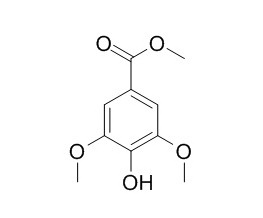Methyl syringate
Methyl syringate is a specific and selective activator of hTRPA1, can regulate food intake and gastric emptying through a TRPA1-mediated pathway and, by extension, can contribute to weight suppression. Methyl syringate has a unique inhibitory activity toward aflatoxin production. Methyl syringate could be effective to suppress hypoxia-induced inflammation, it inhibits the hypoxic induction of COX-2 expression and cell invasion through TRPA1 activation.
Inquire / Order:
manager@chemfaces.com
Technical Inquiries:
service@chemfaces.com
Tel:
+86-27-84237783
Fax:
+86-27-84254680
Address:
1 Building, No. 83, CheCheng Rd., Wuhan Economic and Technological Development Zone, Wuhan, Hubei 430056, PRC
Providing storage is as stated on the product vial and the vial is kept tightly sealed, the product can be stored for up to
24 months(2-8C).
Wherever possible, you should prepare and use solutions on the same day. However, if you need to make up stock solutions in advance, we recommend that you store the solution as aliquots in tightly sealed vials at -20C. Generally, these will be useable for up to two weeks. Before use, and prior to opening the vial we recommend that you allow your product to equilibrate to room temperature for at least 1 hour.
Need more advice on solubility, usage and handling? Please email to: service@chemfaces.com
The packaging of the product may have turned upside down during transportation, resulting in the natural compounds adhering to the neck or cap of the vial. take the vial out of its packaging and gently shake to let the compounds fall to the bottom of the vial. for liquid products, centrifuge at 200-500 RPM to gather the liquid at the bottom of the vial. try to avoid loss or contamination during handling.
US20170000760 A12016, 42740
Chemistry of Natural Compounds2018, 204-206
J Control Release.2024, 375:300-315.
Environ Toxicol.2023, 38(7):1641-1650.
J Sci Food Agric.2023, 103(1):213-220.
Primary and Industrial.2018, 52(11)
Anticancer Agents Med Chem.2023, 23(10):1204-1210.
Foods.2024, 13(11):1739.
Vietnam Journal of Food Control2022, 5(3):pp.390-401.
J Med Food.2016, 19(12):1155-1165
Related and Featured Products
Int J Food Microbiol. 2012 Feb 15;153(3):339-44.
Isolation of methyl syringate as a specific aflatoxin production inhibitor from the essential oil of Betula alba and aflatoxin production inhibitory activities of its related compounds.[Pubmed:
22177852]
Methyl syringate was isolated from the essential oil of Betula alba as an aflatoxin production inhibitor.
METHODS AND RESULTS:
It inhibited aflatoxin production of Aspergillus parasiticus and Aspergillus flavus with IC(50) values of 0.9 and 0.8 mM, respectively, without significantly inhibiting fungal growth. Methyl syringate reduced mRNA levels of genes (aflR, pksA, and omtB) [corrected] encoding proteins required for aflatoxin biosynthesis. Methyl gallate, methyl 3,4,5-trimethoxybenzoate, and methyl 3-O-methylgallate inhibited both aflatoxin production and fungal growth of A. parasiticus and A. flavus. However, their acids and syringic acid did not inhibit aflatoxin production and growth of A. parasiticus significantly, although gallic acid inhibited aflatoxin production of A. flavus with selectivity. The 2,2-diphenyl-1-picrylhydrazyl (DPPH) radical scavenging activity of Methyl syringate was much weaker than that of gallic acid.
CONCLUSIONS:
These results showed that Methyl syringate has a unique inhibitory activity toward aflatoxin production with a different mode of action from that of gallic acid.
Phytomedicine. 2016 Mar 15;23(3):324-9.
Methyl syringate, a TRPA1 agonist represses hypoxia-induced cyclooxygenase-2 in lung cancer cells.[Pubmed:
26969386 ]
We have previously found that Methyl syringate is a specific and selective agonist of the human transient receptor potential channel ankyrin 1 (TRPA1) and suppresses food intake and gastric emptying in imprinting control region mice. Because TRPA1 has been implicated in inflammatory responses, and inflammation and tumorigenesis are stimulated by the cyclooxygenase-2 (COX-2)/prostaglandin E2 pathway in hypoxic cancer cells.
This study examined the effects of Methyl syringate on hypoxia-induced COX-2 in human distal lung epithelial A549 cells.
METHODS AND RESULTS:
The effect of the Methyl syringate on suppression of hypoxia-induced COX-2 in A549 cells were determined by Western blot and/or quantitative real-time polymerase chain reaction. The anti-invasive effect of Methyl syringate was evaluated on A549 cells using matrigel invasion assay.
Methyl syringate suppressed hypoxia-induced COX-2 protein and mRNA expression and promoter activity and reduced hypoxia-induced cell migration and invasion and secretion of vascular endothelial growth factor. These effects were antagonized by a TRPA1 antagonist, implying their mediation by the TRPA1 pathway.
CONCLUSIONS:
Together, these results indicate that Methyl syringate inhibits the hypoxic induction of COX-2 expression and cell invasion through TRPA1 activation. These findings suggest that Methyl syringate could be effective to suppress hypoxia-induced inflammation and indicate an additional functional effect of Methyl syringate.
PLoS One. 2013 Aug 21;8(8):e71603.
The TRPA1 agonist, methyl syringate suppresses food intake and gastric emptying.[Pubmed:
23990963]
Transient receptor potential channel ankryn 1 (TRPA1) expressed in the gastrointestinal tract is associated with gastric motility, gastric emptying, and food intake.
METHODS AND RESULTS:
In this study, we investigated the effects of Methyl syringate, a specific and selective TRPA1 agonist, on food intake, gastric emptying, and gut hormone levels in imprinting control region (ICR) mice. The administration of Methyl syringate suppressed cumulative food intake and gastric emptying. In addition, treatment with ruthenium red (RR), a general cation channel blocker, and HC-030031, a selective TRPA1 antagonist, inhibited Methyl syringate-induced reduction of food intake and delayed gastric emptying in ICR mice. Methyl syringate also increased plasma peptide YY (PYY) levels, but not glucagon-like peptide-1 (GLP-1) levels. The elevation in PYY was blocked by treatment with RR and HC-030031.
CONCLUSIONS:
The present findings indicate that Methyl syringate regulates food intake and gastric emptying through a TRPA1-mediated pathway and, by extension, can contribute to weight suppression.



